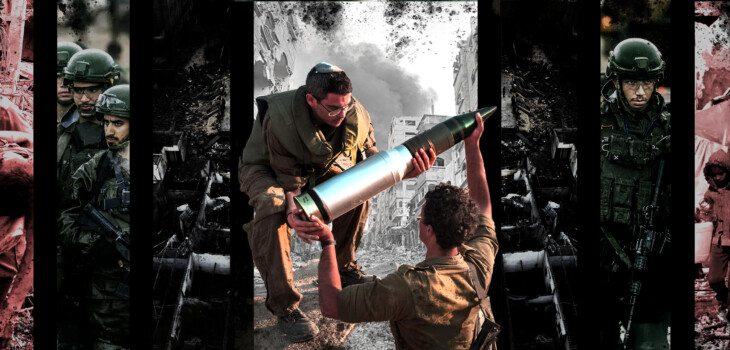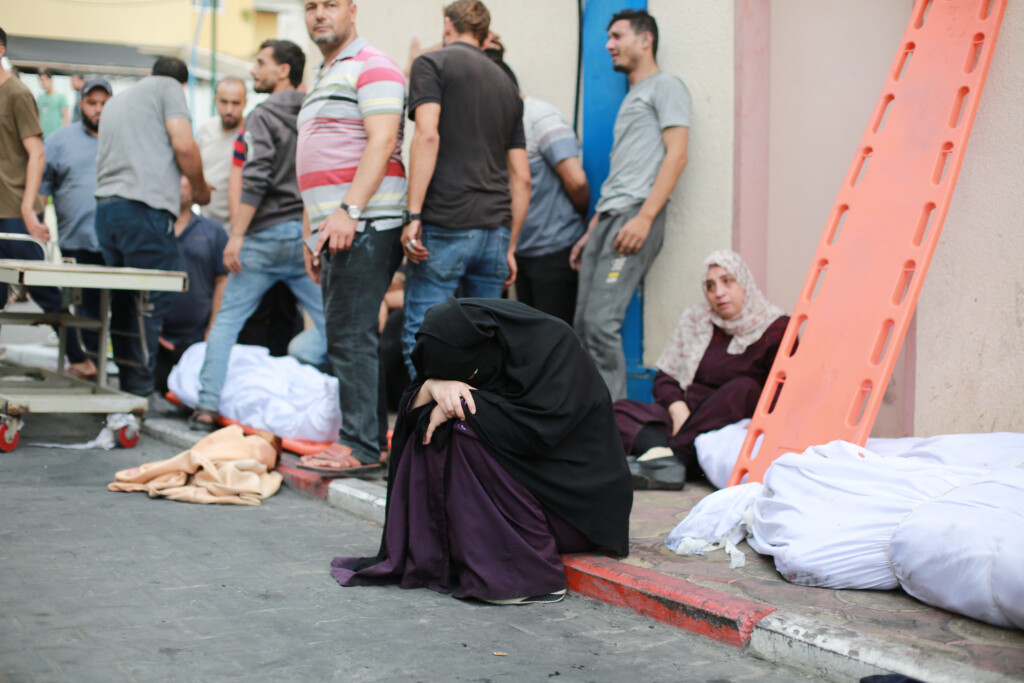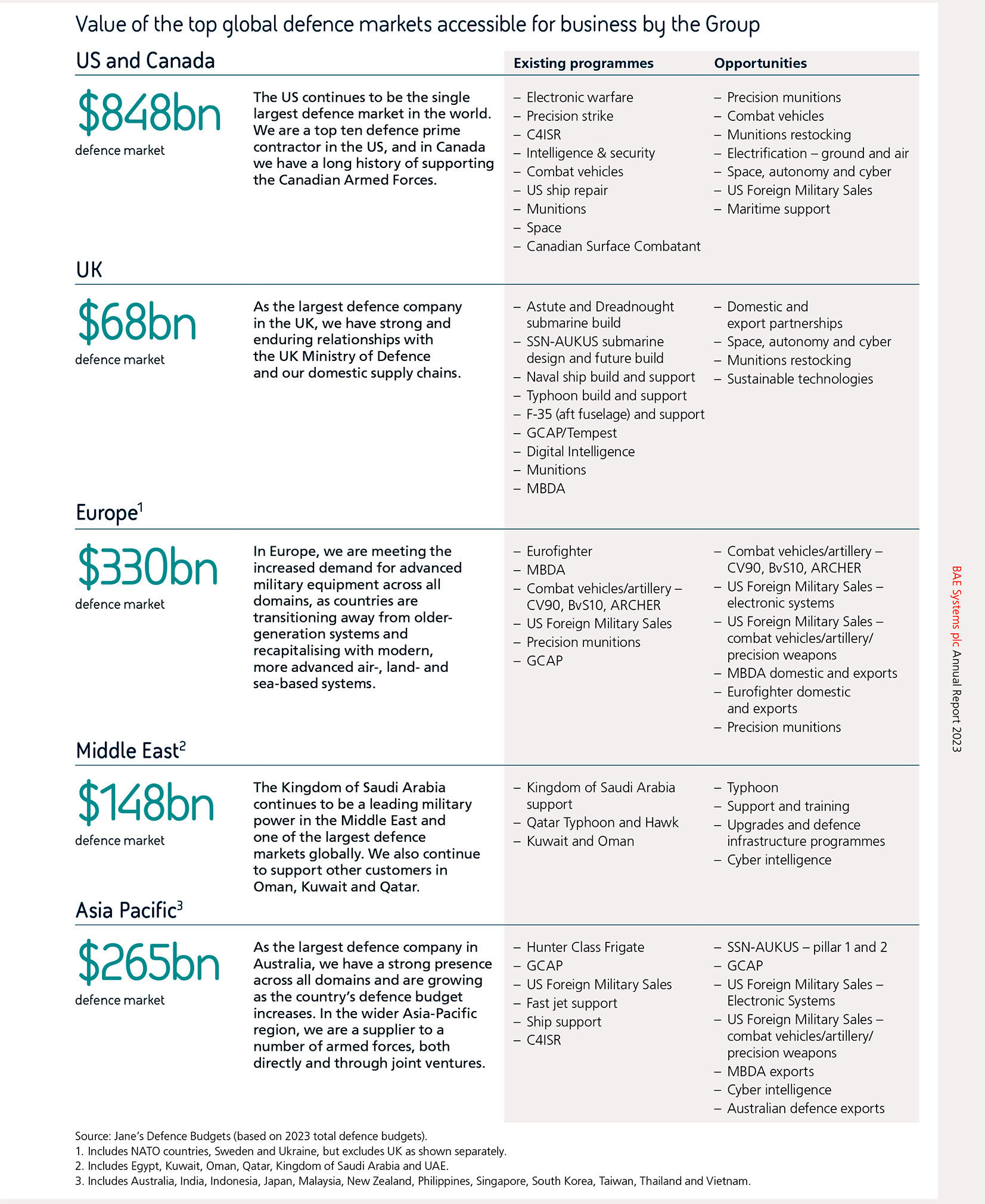WHO’S ARMING ISRAEL?
BAE’S MUNITIONS & WHITE PHOSPHOROUS IN GAZA

This is the second part of a project naming and locating arms companies or industry organisations in the UK that sustain Israeli state terror and Palestinian genocide. It focuses on BAE Systems – the UK’s biggest arms company – and companies linked to BAE. Part one looked at companies producing military equipment which is sold to Israel, such as radar systems, F-35 fighter jets and missile release mechanisms.
Some addresses listed here are factories used to manufacture weapons components that are sold to the Israeli government. However, Corporate Watch would like to emphasise that this is not the case for every address; a number are office sites, and some addresses belong to their subsidiaries – these are included even if there’s no available evidence that those subsidiaries themselves trade with Israel. Each section includes a drop-down menu of addresses and (where available) phone numbers.
“CRIMES AGAINST HUMANITY”
In January 2024, the International Court of Justice ruled that Israel must “take immediate and effective measures” to allow aid into Gaza and that its military halt any actions amounting to genocide. On 26th April 2024, the estimated death toll from the ongoing Israeli onslaught was reported as over 34,000 people, most of them women and children. Every single day more people are murdered. At least 77,000 people have been injured and those who have survived so far are displaced and starving. On 18 March, the Integrated Food Security Phase Classification (IPC) published a report warning of the impending “catastrophic” famine, which will affect around 1.1 million Palestinians. A spokesperson from Medical Aid for Palestinians said:
This is happening because starvation is being used as a weapon of war; the Israeli authorities refuse to allow enough food into Gaza to sustain life…
Children in Gaza are being starved at the fastest rate the world has ever known, and their survival depends on more food, fuel and water entering Gaza immediately, as well as a lasting ceasefire.
At the time of writing, Israeli forces have started to bombard Rafah in southern Gaza and even a brief ceasefire looks unlikely; meanwhile, arms company profits continue to rise. There is growing awareness that arms exports to Israel may well contravene Articles 6 and 7 of the international Arms Trade Treaty. Both the UK and Israel are signatories, although the US quit in 2019 during Donald Trump’s presidency and Joe Biden has still not re-joined. In particular, Article 6 states that countries should not export arms if they have:
…knowledge at the time of authorization that the arms or items would be used in the commission of genocide, crimes against humanity, grave breaches of the Geneva Conventions of 1949, attacks directed against civilian objects or civilians protected as such, or other war crimes…

BAE SYSTEMS
With more than 50 UK sites and a workforce of over 35,000, BAE Systems is the UK’s biggest arms company and the world’s 6th largest by revenue. Its latest financial report shows that in 2023, sales were up 9% to nearly £25.3bn, and it now has a “record level” of orders worth nearly £70bn. Thanks, in part, to the Israeli onslaught in Gaza, in 2024 it expects this to increase between 10% to 12%. All this is good news for BAE shareholders whose dividend payouts have already increased by 11.1% in 2023.
It’s good news too for CEO Charles Woodburn, whose pay package rose to £13.5m in 2023, up from £12m the previous year – and over £4m of that was in cash. According to financial databases, Woodburn’s share stock has quadrupled since 2020 and is now worth £12m. Also benefiting from these record-level orders is Lord Mark Sedwill. Appointed as a BAE non-executive director in 2022, Sedwill is a former NATO representative. Between 2017 and 2020 he was Cabinet Secretary and National Security Advisor (NSA), having previously worked in several government departments including the Home Office. Financial databases show that Sedwill’s BAE earnings jumped from £14,000 in 2022 to £99,000 by 2023.
BAE’S COMPLICITY IN GENOCIDE
Our previous report detailed BAE’s role, alongside several other arms companies, in manufacturing F-35 bombers. F-35s have been described as the “most lethal…fighter aircraft ever built” and are currently being deployed in the strikes on Gaza. Campaign Against the Arms Trade (CAAT) has produced a detailed map of all the UK companies involved in producing F-35 components.
However, BAE’s profiteering from Palestinian genocide doesn’t stop there. As AFSC Investigate (an investigation project of American Friends Service Committee) reported:
BAE Systems supplies the Israeli military with a wide variety of weapons, including components for combat aircraft, munitions, missile launching kits, and armored vehicles. BAE technologies are also integrated into Israel’s main weapon systems, including fighter jets, drones, and warships. These weapons are often gifted to Israel through the U.S. government’s Foreign Military Financing program.
WHITE PHOSPHORUS
BAE manufactures the M109 Self-Propelled Howitzer (SPH) in conjunction with Rheinmetall (see below) to create the “optimal balance between lethality… and reliability” and it is listed as the M109 original equipment manufacturer (OEM). Looking similar to a tank, an SPH is effectively a missile launcher, used on the ground, which fires specialised 155mm artillery (see below) a distance of up to 56km. Reports show that the IDF is using these howitzers to “deal death and destruction” in Gaza. Amnesty has found evidence that M109s used by the IDF in October 2023 fired shells containing white phosphorus. Using white phosphorus in densely populated civilian areas (like Gaza) is forbidden and may amount to a war crime because of its horrific impacts, as Human Rights Watch details:
Upon contact, white phosphorus can burn people, thermally and chemically, down to the bone as it is highly soluble in fat and therefore in human flesh. White phosphorus fragments can exacerbate wounds even after treatment and can enter the bloodstream and cause multiple organ failure. Already dressed wounds can reignite when dressings are removed and the wounds are re-exposed to oxygen. Even relatively minor burns are often fatal. For survivors, extensive scarring tightens muscle tissue and creates physical disabilities. The trauma of the attack, the painful treatment that follows, and appearance-changing scars lead to psychological harm and social exclusion.
BAE insists that it “does not manufacture white phosphorous” but stated it did “supply certain mortars… that contain white phosphorous”. In 2021, it went on to reinstate an “intention” to stop supplying the product and was looking into “alternative solutions and exploring timelines for withdrawal”. However, it is involved in a joint venture called CTA International (CTAI) with French-owned Nexter Systems.
A recent Nexter catalogue includes a number of munitions containing white phosphorus. These include the LU 214 SMK-WP [p 6] and LU 110 SMK-WP [p 9]155mm artillery shells.
CTAI also produces Cased Telescoped Ammunition [CTAS] for tanks, apparently, this “highly accurate 40mm gun” is specifically “suited for urban conflicts”.
According to the BAE website, CTAI munitions are manufactured at the Washington (Tyne and Wear) and Glascoed (Wales) sites.
“HEAVY ARTILLERY, BIG BOMBS AND CRUEL PROCEDURES”
The BAE and Nexter partnership, also produce Bofors 155mm BONUS Munitions. Once fired, these separate into two munitions which can “search for targets” to increase “mission success per round”. One feature of BONUS is that it can be fired through M109 Howitzers. According to BAE, these munitions are produced in Sweden, but there is evidence that BAE exports them to the US via the NSPA (NATO Support and Procurement Agency). BAE also produces a wide range of NATO-compliant 155mm artillery shells which include:
- L15 High Explosive (HE) “The shell body features a thin wall, which is optimised for high fragmentation and blast effect”.
- XL12E1 High Explosive (HE) Extended Range (ER) “adapted from the L15… A screw-on base bleed unit can be used to optimise range extension whilst maximising lethality”.
- L21 High Explosive (HE)
There is a lot of evidence proving not only the IDF’s extensive use of 155mm artillery in previous attacks on Gaza, but also its devastating impact on people. BAE is the UK’s primary manufacturer of 155mm artillery. As far back as 2006, Human Rights Watch signalled that:
Israel’s use of 155mm artillery… may have violated international humanitarian law because it failed to discriminate between military targets and civilians…
It also causes excessive harm to civilians for little “military advantage”. A 2012 collaboration between BAE and Elbit Systems built a 155mm howitzer artillery system for the Israeli military. In 2014, Dr Ahron Bregman, a former IDF major said:
We have international conventions banning, for instance, the use of chemical weapons in war, so it is possible, I believe, to also prohibit the use of heavy artillery, big bombs and cruel procedures in densely populated areas such as the Gaza Strip. After all, it is also in Israel’s interest, as the horrific pictures coming out of the Gaza Strip ruin the country’s already tarnished reputation.
The company boasts of producing a range of 120mm tank artillery shells which offer “maximum lethality and high reliability”. In December 2023, the US authorised sales of 13,981 120mm shells to Israel worth $106.5m (£83.6m) (discussed in more detail below); BAE is on record as supplying Israel (via the US) with at least some of these 120mm mortar carriers. In addition, the company has a new range of 120mm mortar projects under development, with no information available, which is highly concerning given its size.

MISSILES, MISSILES, MISSILES
According to BAE, the company is building a “new explosives filling facility” in South Wales (Glascoed) to create an “eight-fold increase in manufacturing capacity, by 2026”. In 2023, the company announced a £130m increase in Ministry of Defence (MoD) contracts to supply munitions from £280m to £410m, and confirmed the expansion of the Glascoed factory. This is in addition to expanding a “155mm machining line” at the Washington (Tyne and Wear) site. This press release references bolstering “ammunition stockpiles” (more information below) and meeting “increased demand for small arms ammunition” – although it specifically references the Ukraine conflict as this news emerged before the Israeli assault on Gaza.
In addition, BAE has a 37.5% share in a collaboration called MBDA (alongside Airbus and Leonardo) producing “missiles and missile systems”. The MBDA UK subsidiary has a Special Security Arrangement (SSA) with the US which allows confidentiality for “classified activities”. However, Scottish CND has been able to discover that MBDA and BAE manufacture a range of missiles in Beith, Scotland including Tomahawk, Storm Shadow and Brimstone missiles and Spearfish torpedoes. Meanwhile, a recent report indicates that the US is supplying Israel with Tomahawks. Although it’s not known explicitly if these missiles have been used in Gaza, BAE has supplied these to the Saudi-led coalition in the devastating war in Yemen. Staff at the “secretive” Beith site recently took strike action over low pay. At the time of writing, Beith workers have rejected the initial pay offer and voted to continue to strike. CAAT provide further information on MBDA here.
In 2021, Elbit Systems bought BAE’s subsidiary Rokar. This company is the Israeli Air Force’s “sole supplier of anti-missile defense systems installed on F-15 and F-16 fighter jets, as well as Apache attack helicopters”. In 2015, BAE collaborated with the Israeli military to develop the Rokar Silver Bullet. As AFSC Investigate notes: “BAE has supplied Israeli weapon manufacturer IMI Systems (owned by Elbit Systems since 2018) with its Silver Bullet for integration into M401 155mm cannon artillery”. Despite the Elbit takeover, BAE’s website still promotes Rokar’s “combat-proven” “electronic countermeasures systems” and offers training and maintenance.
ADDRESSES AND SOURCES
The information here is sourced from financial databases and UK company register Companies House, with addresses cross-referenced with sources such as company job listings and Google Maps. All the information is already in the public domain, although some is hidden behind subscription paywalls.
As mentioned, while the parent company produces weapons sold to Israel, there isn’t necessarily evidence all subsidiaries do. It is therefore likely that some subsidiaries will deny involvement, even if they are all part of the same deadly profit-making machinery.
THE BAE/ISRAEL CONNECTION
As Corporate Watch previously reported, the true value of UK-Israel exports is shrouded in secrecy due to the British government’s use of “unlimited-value” (or open) licences where the full value is not known. What has been established however is that since 2015, the UK has issued 57 open arms licences to Israel with ten of these in 2022 alone. The most recent government data on (closed, single-use) arms exports reveals that most UK exports go to the Middle East (43%), and that in 2022, the value of Standard Individual Exports Licences (SIELs) was worth £70.6bn – the highest since records began. Given the ongoing conflicts in Palestine and Ukraine, it seems highly plausible that SIELs value will soar again.
In terms of potential BAE exports heading to Israel from the UK, Corporate Watch has been able to establish the following information.
The image below shows the values of BAE’s global markets from its 2023 Annual Report. Although there is no specific mention of Israel, we have examined BAE’s export relationship with the US. As we detail below, there is strong evidence to suggest this route facilitates the delivery of some UK-manufactured weapons to Israel. Of note, in particular, are details about: munitions and precision munitions, combat vehicles, F-35, export partnerships, MDBA and “munitions restocking”.
Worth $848bn, the US/Canada market is by far the most lucrative for BAE. The report also notes that BAE is “dependent upon US and UK government support” to create a range of export market “business opportunities”. It offers a glimpse into how UK arms exports work, primarily on a “government-to-government basis” but also that this can involve “military training” and promotional support from ministers, or UK Export Finance support. However, it also notes that most BAE exports to the US are delivered through its Foreign Military Sales (FMS) process. In 2023, the value of US FMS increased by 55% to £80.9bn (£69bn).
A recent report from the Stockholm International Peace Research Institute (SIPRI) states that 60% of Israel’s arms exports come from the US, with the next largest country being Germany (30%).
In reference to supplying munitions, BAE’s 2023 report also notes that it supports “the UK’s NATO allies, as well as other customers” and has committed investment to “support increased demand”. Although Israel is not a NATO member, it is recognised by the US as having Major Non-NATO Ally (MNNA) status which brings a range of defence-related benefits.
STOCKPILES AND EXPORTS
Israel’s prime minister Benjamin Netanyahu has repeatedly requested more munitions from the US since October 7 and it’s on record that there are already vast stockpiles of US weapons worth billions of dollars currently in Israel. On 19 October, the US agreed to Israel’s request for “tens of thousands of 155mm artillery shells” to replace the emergency stocks of US ammunition held in Israel which was reportedly intended for Ukraine. In December 2023, Joe Biden bypassed Congress to issue further emergency arms sales of 120mm tank explosives worth $106.5m (£83.6m). Later that month, Antony Blinken bypassed Congress again, to approve sales of 155mm artillery worth $147.5m (£115.9m) to Israel. Concern has been rising about what the US might add to this stockpile without proper scrutiny. Given the Biden administration allocated over $13bn (£10.3bn) to Israel under Defense Department emergency funding measures for the 2024 financial year, these concerns seem well-founded.
In the fiscal years 2020 to 2025, the total figure for fulfilling BAE export contract “obligations” from the UK to the US Department of Defence is nearly $26bn (£21.1bn). This chart from the official federal government spending site shows how dramatically those procurement orders spiked between October to December 2023 and the first quarter of 2024.

Given the opacity of UK arms licences, Corporate Watch couldn’t locate contracts showing the extent of direct BAE exports to Israel, but Action on Armed Violence (AOAV) notes the company has a “definite link” with Israel. The Panjiva export database confirms a large volume of UK-US BAE exports over the past year, and the UK’s own export data (Strategic export controls, 2023) lists Israel as one of the “Ultimate End User” countries for UK exports. Furthermore, the full extent of what the US may be sending to Israel is impossible to establish because:
A legal loophole in the US Arms Export Control Act – which governs the export and end-use of weapons shipped from the US – means only packages of a certain value need Congressional oversight, meaning “bundled packages” below that value are being slipped through regularly.
The extent of Israeli destruction in Gaza is so constant and vast, that it may take years for independent weapons monitors to accurately identify which companies have supplied certain munitions. For example, the International Network on Explosive Weapons emphasises that Israel’s use of explosive weapons in the Occupied Territories is “so frequent” that it can’t use standard methodologies to “attribute civilian casualties to specific incidents of use”. In other words, the intensity of the bombardment is so extreme that existing methodologies to link specific munitions to deaths may not be possible in Gaza.
The evidence indicates that not only does BAE export arms components directly to Israel, but that its weapons are being sent there via the US – although to what extent is impossible to confirm.
RHEINMETALL
German-owned Rheinmetall operates here as Rheinmetall Defence UK and runs five UK divisions, which include Rheinmetall BAE Systems Land (RBSL). The company manufactures the “battle-tested” cannon for BAE’s M109 Howitzer mentioned above.
In November 2023, Israel asked Germany to send “10,000 rounds” of 120mm “precision ammunition” manufactured by Rheinmetall. According to its website, Rheinmetall recently gave BAE a £3m order to “manufacture…artillery shell bodies to satisfy a German government order”.
There is also a deal as part of the “Rheinmetall Elbit” team to develop a “fully automated wheeled self-propelled howitzer”. In addition, “under a cooperation agreement” with Israeli company UVision Air, Rheinmetall makes Hero Loitering Munition systems. These are effectively drones which can drop bombs. Apparently, these offer both surveillance features and “unparalleled organic lethality”. Following orders worth “tens of millions of Euros”, deliveries are due to conclude next year.
SUBMERGING IN SUBSIDIARIES
Like most corporate giants, BAE Systems Plc is the parent company of a vast sprawl of subsidiaries. Corporate Watch has reviewed this list to identify other subsidiaries directly linked to Israeli state actions.
AVIVA
Two “Aviva Investors Infrastructure” companies are subsidiaries of BAE Systems Pensions Funds Trustees Limited. Aviva, the UK’s “largest general insurer”, has already been named and shamed by boycott and divestment groups. A 2017 report by War on Want found that even then, Aviva held £801.2m of investments “in companies known to provide equipment to the Israeli military”. Although Aviva tried to distance itself from the findings, its direct links to BAE indicate that little has changed.
PULSE POWER AND MEASUREMENT
One strand of this BAE-owned subsidiary, which makes electrical components, is called VitaLite Communications. VitaLite has an ongoing partnership with Israel to “provide public communications, networks, cellular and landline, by leading Israeli companies, the military and security agencies”.
FUELLING GENOCIDE
Many recent global conflicts have been fuelled by competition over energy resources. So as the death toll in Gaza rises, it is pertinent to remember the symbiotic relationship between the military-industrial complex and its twin, the fossil fuel industry.
As part of its brutal occupation and total stranglehold on Gaza’s economy, Israel has long controlled the Strip’s supply of gas and electricity. Gazans are not even permitted to fish along their coastline. But when, in the late 1990s, huge reserves of gas were discovered indisputably within Gaza’s territorial waters, Israel had to ensure that this would not become Palestine’s ticket to independence and self-sufficiency. As Palestinian journalist Yousef Alhelou explains:
If Palestinians were to have free access and drilling rights to their fields, this would reduce their reliance on foreign aid and Israeli energy and be self-sufficient in electricity generation in both Gaza and the West Bank.
In 2012, journalist Nafeez Mosaddeq Ahmed explained the significance of the gas fields in the context of Israel’s own energy supply shortage, detailing Israel’s attempts to deny Palestinians their rights to them since their discovery. These attempts included Operation Cast Lead, when over three weeks in December-January 2008-9 the IDF massacred an estimated 1,417 Palestinians, including 313 children which he described as “directly, though not exclusively” motivated by Israel’s concerns over the deals being proposed for the Gaza gas reserves. A year before, Moshe Ya’alon, then Israeli deputy PM wrote:
It is clear that without an overall military operation to uproot Hamas control of Gaza, no drilling work can take place without the consent of the radical Islamic movement.
Israel had already claimed ownership of the enormous Tamar and Leviathan gas fields, when in December 2022 the government organised bidding for contracts on their exploration. Palestinian organisations including Adalah, the Legal Center for the Protection of Arab Minority Rights in Israel, have claimed that this is a violation of international law. Then on October 29th 2023, three weeks into the current onslaught of Gaza, Israel announced that it had awarded twelve exploration licences for these fields to six companies, including BP. The timing of the announcement appears to be aimed at bolstering investor confidence in Israel: as Israel’s Minister for Energy and Infrastructure stated: “Precisely at this time, giant natural gas exploration companies are expressing confidence in Israel’s resilience and want to invest here”.
British-Syrian Journalist Richard Medhurst puts forward a convincing argument suggesting that removing Hamas and securing access to the Gazan gas fields is crucial in establishing Israel’s aim to be the largest provider of gas to Europe, now that Russia is no longer fulfilling that role. This further demonstrates how access to Palestine’s natural resources plays a pivotal role in this genocide, as well as to Israeli (and by extension US) geopolitical ambitions.
Fossil fuel and arms companies are, perhaps unsurprisingly, closely linked and revolving doors are common. Prior to joining BAE as its CEO, Charles Woodburn worked in the oil and gas industry, including as CEO of the Expro Group. Perhaps it’s just coincidence, but Expro already undertakes preparatory work in the Tamar and Leviathan gas fields.
As we can see, the interests of fossil fuel and arms companies are, in Palestine as in many other places, very often intertwined: extraction fuels destruction.

FROM THE RIVER TO THE SEA!
Technological advances in weaponry by companies such as BAE have enabled energy-hungry states worldwide to commit mass murder for control of dwindling fossil reserves. Meanwhile, hugely powerful corporations cannot resist the profits they can make by serving as their handmaidens. Palestinians have faced systematic dispossession, oppression and violence from the Israeli state since the 1948 Nakba: meaning catastrophe. The current grab for land and gas is a genocidal continuation of this.
Benjamin Netanyahu has demanded “munitions, munitions, and munitions” from his proxy allies, and the US and UK continue to deliver. Meanwhile, bombs continue to fall on civilians in Gaza and arms company profits continue to rise. There’s no sign our government will listen, and companies persist in protecting their reputations and profit margins.
However, resistance is rising. In March 2024, Elbit announced that it was forced to shut its Tamworth factory due to falling profits and mounting security costs incurred following repeated occupations by Palestine Action. Whether it comes from asking questions to local councils who may be leasing land to the arms giants, occupying universities that invest in the industry, or making our presence known at their factories: keeping up pressure on the arms companies is a critical aspect of the global mass movement of solidarity.
Additional mages via Wikimedia Commons

No comments:
Post a Comment